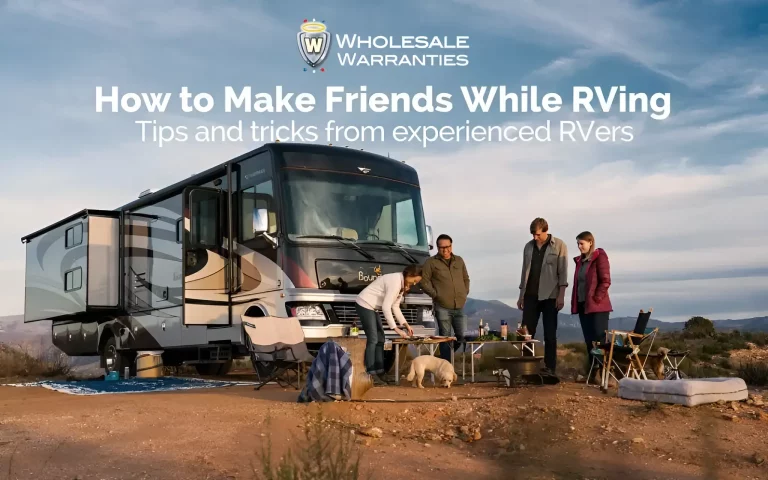RV Life is full of exciting adventure, but sometimes things just go wrong. A mechanical component fails. You blow a tire. Someone smashes your window. Although these things don’t happen everyday, some misfortune is inevitable, and it is important to have some form of RV protection in place so you can be prepared for the worst. That way, you are saving yourself money and stress in the event of something like a major breakdown.
There are a couple different ways to protect your travel budget by securing coverage for your RV. There is RV insurance, and there are RV extended warranties. People often ask what the difference is and whether it’s worth having both RV insurance and an extended RV warranty. In this article, we walk you through their similarities, highlight key differences, and offer guidance about how to best cover your home-on-wheels!
Main Similarities
RV insurance and RV extended warranties are both forms of coverage designed to protect your finances from potential repair costs. Both involve proactively securing policies that will step in when something unfortunate occurs with your RV. At Wholesale Warranties, we believe you should have both.
Key Differences
The main difference between RV insurance and RV warranties is what they cover. Insurance covers damages incurred from an accidental incident, physical damage, weather, vandalism and more. RV extended warranties cover mechanical and electrical components in your rig that fail unrelated to an accident. Additionally, minimum insurance coverage is legally required in each state, whereas warranties are optional for additional protection.
RV Insurance
As the name suggests, minimum liability insurance offers basic protection for accidents. These plans generally meet your state’s required insurance minimum. Minimum liability coverage will typically pay for bodily injury as well as damages incurred by other vehicles involved in the incident. Some liability insurance plans will also cover legal action that may arise as a result of the accident.
Comp and Collisions Insurance
Comp and collisions insurance policies extend the scope of coverage. These policies often protect the insured driver when there is an uninsured motorist involved in an accident. Additionally, this type of policy will often also cover things like vandalism, vehicle and belongings theft, and even weather damage. Comp and collisions coverage is typically customizable to a degree as well. Policies offer add-ons that RVers can choose based on how they use their vehicle.
This type of insurance also features Total Loss. Total Loss refers to a situation in which the cost of salvaging or repairing the damaged vehicle exceeds the insured value. Total Loss coverage outlines the payout amount if your RV is unrecoverable. Some insurance policyholders will opt for Market Value, which means that insurance will reimburse the policyholder for their vehicle’s current market value. RVers also have the option to upgrade to Total Loss Replacement. This plan will allow you to replace your RV with a similar model at a price comparable to your original purchase price.
RV Extended Warranties
An RV extended warranty is an optional form of protection purchased in addition to insurance requirements. RV warranties, or extended service contracts, help cover the repair costs of failed mechanical components. The warranty broker, such as Wholesale Warranties, will step in to cover labor, repair, and replacement expenses in the event of a breakdown. RV Warranties cover items that would otherwise be very expensive to repair or replace, such as the engine, transmission, generator, slide-outs, refrigerator, and many more. There are two main types of warranties: comprehensive coverage and exclusionary coverage. Each offers its own benefits. Get a free quote for an RV Extended Warranty today.
Comprehensive RV Warranty Coverage
A comprehensive RV warranty explicitly outlines each covered component. If your failed part is included on the list, then your comprehensive warranty covers it! This protection plan is not as extensive as an exclusionary plan; however, it is more cost effective. Besides, you will likely have the option to customize your plan with add-ons!
Exclusionary RV Warranty Coverage
An exclusionary coverage plan will list each exclusion, or coverage exceptions. This means that if components are not included on the short list of exclusions, then they are covered. These RV warranties entail a higher level of coverage. Exclusionary coverage is ideal for maximum protection, so long as you are willing to pay a higher rate. You will likely end up saving more money on repairs if you invest in an exclusionary policy. When considering purchasing an RV extended warranty policy, it is important to keep in mind that RVs are prone to major breakdowns.
Should you have both?
Due to legal obligations, you are going to have an insurance policy regardless. Of course, we believe that having an RV extended warranty is worthwhile. The warranty covers what insurance doesn’t: wear and tear, and the malfunction of major mechanical components. These failures happen more often than you might think, and the cost of RV repair is only going up as demand for parts and labor surges. Your insurance company is not going to pick up the bill if you experience an engine failure, and that bill will likely be 5 figures.
Although they serve similar purposes, insurance and warranties should be treated as the separate entities that they are. Insurance often meets a bare minimum requirement, whereas extended warranties can offer years of guaranteed additional protection. Not only does a warranty have the potential to save your travel budget thousands of dollars on repair costs, it will give you the peace of mind on the road ahead. For a free quote, just fill out the form below!




